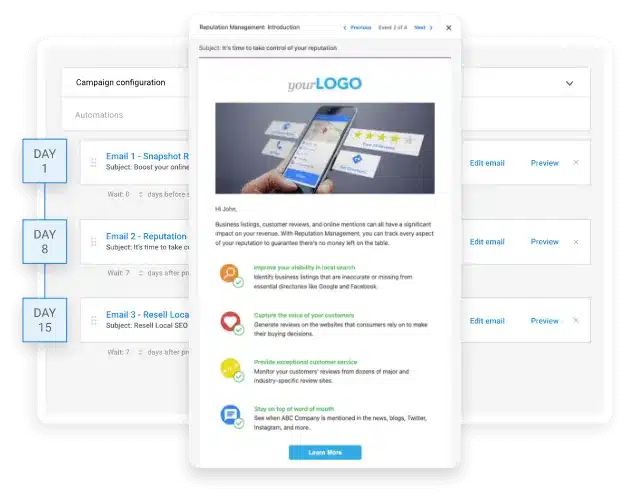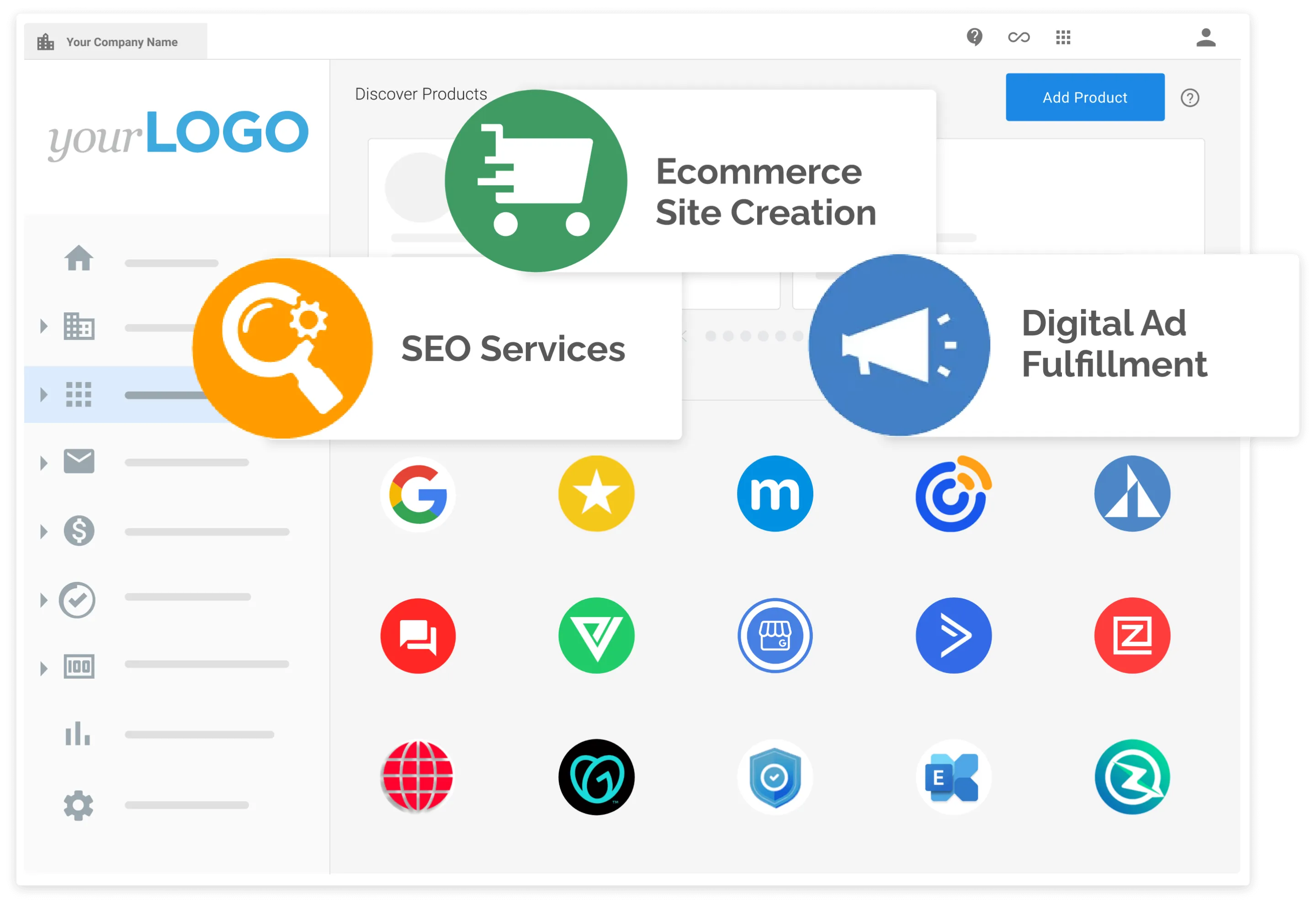Content automation is revolutionizing the way agencies and businesses manage their marketing efforts. As content continues to play an important role in building brand awareness, engaging communities, and driving organic traffic, its creation remains a labor-intensive process.
For agencies, delivering fresh, high-quality content consistently can be both time-consuming and expensive. That’s where content automation comes in. It simplifies the content lifecycle—from creation to distribution—allowing agencies to deliver outstanding results at scale, without the heavy lift.
In this guide, we’ll walk you through the ins and outs of content automation, explore its benefits, the essential tools you’ll need, steps for implementation, best practices, and future trends for agencies adopting this powerful technology.
Scale faster with one platform built for client acquisition and engagement
What Is Content Automation?
Content automation refers to the use of tools and technology to manage any part of the content marketing life cycle, including content creation, distribution, and management.
With the rapid rise of AI content marketing tools, this includes the use of algorithms to handle tasks that previously required manual input from marketers. This can range from generating blog posts and social media updates to posting content across multiple platforms and analyzing performance metrics.
The Tech Behind Content Marketing Automation
If you’ve explored other marketing automation examples, you’ll be familiar with some of the latest technologies behind the most powerful automation tools:
- Artificial intelligence: AI algorithms analyze data and generate content that mimics human writing.
- Natural language processing (NLP): NLP enables machines to understand and produce human language, improving the quality and relevance of automated content.
- Machine learning: Machine learning models learn from vast amounts of data to enhance the accuracy and effectiveness of content automation tools, such as choosing the optimal times to post content.
Content Automation vs. Marketing Automation: What’s the Difference?
While both content and marketing automation aim to give marketers more time by putting many routine marketing processes on autopilot, they differ in their focus.

Content automation specifically refers to the creation and distribution of content, while marketing automation encompasses a broader range of activities, including email marketing, lead generation, and project management automation.
Many other specialized tools have emerged to help marketing agencies and consultancies perform their jobs more efficiently, like SEO automation software and task automation software. Taken together, all of these tools can be used as part of a robust marketing automation strategy.
Types of Content Automation
If you sell services to local small businesses, you’re aware that their content needs are nearly as complex as those of their much larger counterparts. Given their more limited resources, AI solutions for small businesses have been game-changing in helping them stay competitive. Let’s take a look at the different types of content automation from which businesses of all sizes can benefit.
Advertising Content Automation
Content marketing and pay-per-click (PPC) advertising are often thought of as two distinct components of a complete digital marketing strategy, but in reality, they’re interconnected. Great content is required for successful PPC campaigns.
The most popular advertising platforms have impressive built-in automation features to create better ads:
Google Ads
Google Ads automation features include:
- Responsive ads: Ads are automatically adjusted to look best in the available ad space.
- Dynamic ads: Generate ads based on your catalog tailored to each user’s unique queries, improving relevance.
- Ad suggestions: Built-in AI-powered recommendations for improving ad copy and targeting based on performance data.
Meta Ads
Meta also incorporates automation features to enhance ad campaigns:
- Multiple ad versions: Automatically create and test different ad variations—including the image and copy—to identify top performers.
- Audience suggestions: Use AI to suggest target audiences based on campaign goals and past performance.
- Performance notifications: Receive automated alerts on ad performance and recommendations for optimization.
Depending on the niche in which you’re marketing, other ad platforms with content automation platforms can also play a role in your strategy: LinkedIn, X, TikTok, and Reddit all include features to help marketers efficiently share content through ads to maximize conversions.
Content Creation Automation
When it comes to automation, content creation is the most widely known capability. Tools like ChatGPT and Claude can be used for content brainstorming, outline creation, and content writing, while many organizations have their own proprietary automated content writers, such as Washington Post’s Heliograf or Forbes’ Bertie.
Beyond straightforward content creation, content automation tools can also be used to ensure SEO and formatting best practices are maintained. For example, pre-designed templates can be used to establish text formatting, headings, bullet points, and other styles.
Here’s an example of how you can set custom instructions for AI-generated social content:
AI-powered tagging can further boost the discoverability of content by making it more scannable by search engine crawlers.
As game-changing as automated content creation is, there are important limitations to be aware of. Many AI NLP models like the ones discussed above lack the creativity and nuance of human writing, making them poor 1-to-1 replacements of professional content creators.
This is especially true when it comes to complex topics that require deep contextual understanding. They’re also only as good as the data on which they’re trained, and even then, it’s possible for them to make mistakes. Humanization of content and human review of AI-generated copy remains important for AI businesses offering these services.
Content Distribution and Promotion Automation
When starting an AI agency, as your client list grows, staying on top of posting and managing large amounts of content becomes more complex.
Marketing automation tools for content marketing enable teams to manage campaigns by automatically scheduling and publishing content effortlessly. This holds true for multi-platform campaigns as well, thanks to content syndication features that repurpose content.
Similarly, email marketing automation platforms save time by automatically segmenting audiences, personalizing messages, and delivering them at optimal intervals.
Top Tools for Content Automation in 2024
New tools are always emerging, and the ideal choice for your agency startup depends on your goals and budget, but these are some of the top choices in 2024.
Vendasta
Vendasta offers tools that streamline the creation, management, and distribution of content. This includes white-label content services, AI content tools, social media automation, SEO tools, campaign automation, and content performance reports.
Semrush
Semrush offers a comprehensive suite of automation capabilities that streamline and automate different aspects of the content creation process. This includes keyword research, content creation, content optimization, and analytics.
Zapier
Zapier connects various tools and automates workflows, such as linking a content calendar to a social media scheduler or triggering specific content distribution tasks based on predefined criteria.
PicsArt
PicsArt empowers creators to design stunning visual content with advanced photo editing and creative tools, offering everything from AI-powered background removal to artistic filters and effects. The platform combines professional-grade editing capabilities with an intuitive interface for social media content, digital art, and brand graphics. Key features include AI photo editing, cmyk color generator, creative templates, and collaborative design workflows.
Canva Pro
Canva Pro allows teams to create and automate visual content, providing templates for social media graphics, presentations, and more with an easy-to-use design platform. Key features include design templates, brand kit, and content collaboration.
HubSpot
HubSpot‘s CRM includes a content automation solution to help automate the creation and distribution process. This includes a blog editor, SEO recommendations, email sequences, social media scheduling, and reporting.
How to Implement Content Automation
Follow this step-by-step gameplan to implement automation for content, whether you’re doing it for your agency or making money with AI by selling content marketing services:
- Establish goals: Determine specific, measurable goals that you hope to achieve through your content marketing campaigns.
- Research keywords: Use keyword research tools to identify the best keywords for your content.
- Generate content ideas: Based on your goals and target keywords, come up with a variety of content types that make sense for your business. Then, use content automation tools to generate content ideas in each category.
- Integrate your content tools: Use AI integration services to link your automation tools to your CRM and marketing automation platforms. This will ensure you accurately track the performance of your campaigns.
- Create, edit, and optimize content: Use AI writing tools to outline, write, and edit your content. Be sure to have a content marketer look over it and humanize it.
- Set up automation rules and triggers: Establish rules and triggers for when you want content to be published.
- Test and optimize your automation process: Test publish some content to make sure your automations are running properly. Periodically review your metrics and adjust your campaign strategy to continue boosting ROI.
Best Practices and Tips for Content Automation
From AI-powered funnels to AI website builders, new technologies give marketers more capabilities than ever before. But to get the most out of automation, it’s important to stick to the following best practices:
- Maintain a balance between automation and human oversight: If you are not maintaining a balance between automation and human oversight, the quality and authenticity of your work will suffer.
- Personalize automated content for better engagement: This helps users feel they’re receiving a message tailored to their needs rather than a mass communication.
- Monitor and analyze automation performance metrics: Across your omnichannel marketing automations, keeping track of metrics is essential to maintaining a healthy ROI.
- Stay up-to-date with the latest automation trends and technologies: Tech is advancing faster than ever, and tomorrow’s successful agencies embrace the possibilities of new tools.
- Be aware of common concerns: There are legitimate concerns in the content automation space regarding quality, authenticity, and privacy. Be sure to choose tools that align with your ethical and quality standards.
The Ultimate Solution for Content Automation
When it comes to content automation, Vendasta stands out as a powerhouse solution that empowers agencies to streamline content workflows and deliver outstanding results to clients.

Here’s why Vendasta is the top choice for content automation:
- End-to-End Content Management: Vendasta covers every stage of the content lifecycle, from creation to distribution. The platform includes tools for crafting high-quality content, automating social posts, managing SEO, and analyzing performance—all in one integrated solution.
- AI-Driven Content Creation: Vendasta’s platform leverages advanced AI tools for digital marketing agencies to assist with content ideation, generation, and editing. This includes everything from social media content to email creation and review responses.
- Social Media and Distribution Automation: With Vendasta’s Social Marketing tool, agencies can easily schedule, publish, and manage social media posts across multiple channels. Agencies can consistently engage with audiences without spending hours on manual scheduling.
- White-Label Content Services: Vendasta’s Marketplace offers access to white-label content services, enabling agencies to outsource specific content needs. This option allows for a flexible and scalable approach to content, making it easy to adjust output based on clients’ needs.
- Robust SEO and Performance Analytics: Vendasta’s SEO tools ensure that content is optimized for search engines, while reporting features help agencies track key metrics, making it simple to demonstrate ROI to clients and optimize strategies based on data.
- Built-in Reputation Management: Responding to reviews and managing reputation is a crucial aspect of content for local businesses. Vendasta’s tools help automate responses, offering customizable templates that maintain brand voice, increase engagement, and support client reputations.
Vendasta’s all-in-one solution makes it the best platform for agencies looking to leverage content automation at scale. With Vendasta, agencies can confidently deliver high-quality, on-brand content while freeing up valuable time to focus on strategy and client relationships.
The Future of Content Automation
As AI and machine learning technologies are expected to become more sophisticated, the creation of highly personalized and data-driven content will be even more accessible to small businesses. Tools that support voice and visual content automation will also emerge, expanding the types of content that can be automated.
As these technologies evolve, digital agencies will need to adapt their strategies to stay competitive. Embracing these advancements will be key as continued advancements drive new opportunities for innovation and growth.
Looking for a powerful solution to streamline your content creation and distribution? Vendasta offers AI-driven tools that simplify every step of the content marketing process, allowing agencies to deliver high-quality results at scale without the heavy lifting. Check it out by requesting a demo today.
FAQs
1. What is content automation?
Content automation is the use of AI and software to streamline content creation, distribution, and analysis. It reduces manual work by handling tasks like generating blog posts, scheduling social media, and analyzing performance. This saves time while ensuring consistency and scalability.
2. How does content automation work for agencies?
Content automation works by using AI, machine learning, and automation workflows to handle repetitive marketing tasks. For agencies, it means scheduling content across multiple platforms, personalizing messaging, and analyzing results without manual effort—helping them deliver consistent results to clients at scale.
3. Why is content automation important in digital marketing?
Content automation helps agencies and businesses publish high-quality, consistent content without overloading their teams. It improves efficiency, reduces costs, and ensures campaigns run smoothly. By automating repetitive tasks, marketers can focus on strategy, creativity, and building stronger client relationships.
4. What are the main benefits of content automation?
The main benefits include saving time, reducing costs, increasing consistency, and improving ROI. It also enhances personalization, ensures better timing for content distribution, and provides actionable insights through reporting. This makes it easier to scale marketing campaigns without sacrificing quality.
5. Can Vendasta help with content automation?
Yes. Vendasta offers an all-in-one platform that automates content creation, scheduling, SEO optimization, and reporting. Agencies can use Vendasta’s tools to manage social posts, create AI-driven content, and access white-label services, all while keeping their brand front and center.
6. What types of content can be automated?
Almost every type of digital content can be automated, including blogs, social media posts, ad copy, review responses, email campaigns, and reports. Tools also support visuals like graphics and videos, making it easier for agencies to deliver multi-channel campaigns consistently.
7. Do I still need human input if I use content automation?
Yes. While automation handles repetitive tasks, human oversight ensures creativity, quality, and accuracy. Agencies should combine automation with editorial review, strategic planning, and personalization to maintain authenticity and avoid overly generic or robotic content.
8. How can agencies measure the success of content automation?
Agencies can track KPIs such as engagement rates, organic traffic growth, lead conversions, and content ROI. Platforms like Vendasta provide performance dashboards and reports, making it easy to show proof of performance to clients and refine content strategies over time.
9. Is content automation suitable for small businesses?
Absolutely. Small businesses benefit from automation because it saves time, reduces costs, and ensures consistent online presence. Even with limited resources, SMBs can compete with larger brands by using automation for social posts, reviews, and email campaigns.
10. How do I get started with content automation?
Start by defining goals, selecting the right tools, and automating small but high-impact tasks like social media scheduling or client reporting. Vendasta makes it easy with AI-powered solutions and white-label services, allowing agencies to scale automation gradually and effectively.


